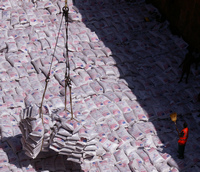In a surprising move with huge implications for one of the world's gravest humanitarian crises, last week the Somali Islamic group Al-Shabab told the U.N. World Food Program to stop sending foreign food aid to southern Somalia.
According to a report from Voice of America, a U.S. government-funded TV news network, Al-Shabab claimed that the "massive importing of food is ruining Somalia's agriculture sector." The Islamists reportedly ordered the U.N. to begin buying food directly from local producers, for onward distribution to the country's needy.
The announcement is surprising and potentially worrisome, for several reasons. The move clearly reflects the increasing entrenchment of Al-Shabab in southern Somalia, a year after former affiliates of the group split away to join the U.S.- and U.N.-backed Transitional Federal Government that controls key portions of Mogadishu and northern Somalia. That Al-Shabab even concerns itself with agricultural policy indicates the group is secure enough to partially turn its attention away from fighting the TFG.

